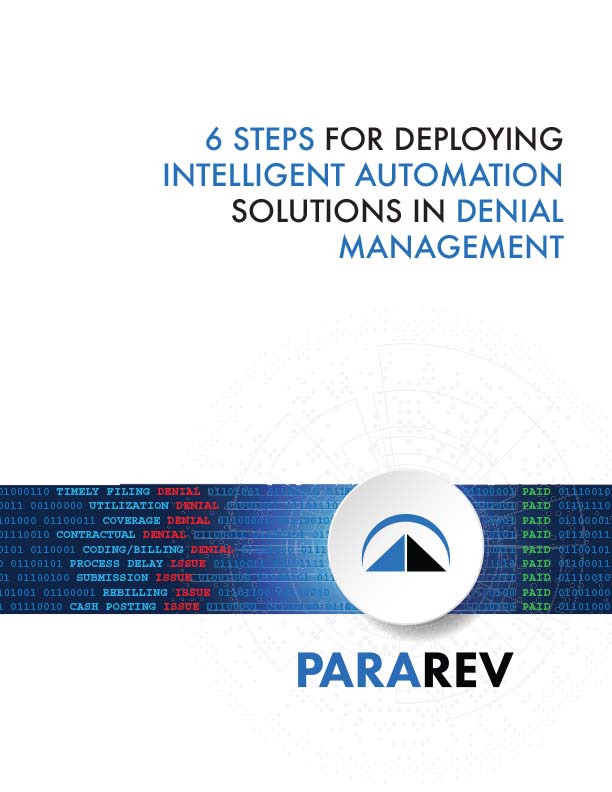Because clinical laboratory claims typically are low-dollar amounts generated in large volume, many hospitals have concluded it’s simply not cost-effective to aggressively pursue laboratory denials when they occur, given the resources required to work them and the nominal returns resolution can produce. This results in an often-significant number of write-offs.
However, hospitals that shift their thinking and no longer view laboratories as simply cost centers can generate a substantial source of new or “found” revenue by taking a more aggressive and systematic approach to lab denials. Strong denial management programs are especially important for hospitals that seek to expand their outreach business and transform the lab into a profit center.
Comprehensive lab denial management includes intelligent automation processes that can resolve the simplest denials without human intervention while supporting detailed analysis and identification of denial root causes.
Healthcare Financial Resources (HFRI) partners with hospitals to address denials and identify denial root causes for emergent, inpatient, outpatient, laboratory and other ancillary services. From this experience, we’ve determined that the failure to obtain prior authorizations and medical necessity confirmations, as well as inaccurate or incomplete documentation, represent the most common reasons for laboratory denials.
Verifying prior authorizations
Because prior authorizations typically are the responsibility of either the referring physician practice, the emergency department or the hospital’s precertification department, making sure authorizations are obtained is usually beyond the control of the pathology group and laboratory. But unless the testing is conducted during emergent care, it is probable that the test is pre-scheduled. Therefore, pre-authorization can and should take place when the lab work is scheduled.
It admittedly can be difficult for the laboratory or hospital staff to keep track of the many and varied insurance company pre-authorization guidelines. But most carriers provide links on their websites that identify the procedures or tests requiring pre-authorization, and hospitals should be able to consolidate these links for easy access or create their own documents for internal use.
In any case, laboratories should develop their own pre-authorization check systems to confirm decisions from the referring physicians. They should avoid simply relying on oral assurances from the referring doctors, particularly if the physician practice has been a significant source of denials in the past.
Like the failure to secure prior authorizations for commercially insured patients, neglecting to document medical necessity or submitting claims without specific or appropriate diagnosis codes can have a major impact on reimbursement.
Documentation
Toxicology tests is another category that continues to generate significant numbers of denials. According to the Centers for Medicare & Medicaid Services (CMS), the majority of the denials for the category of “Laboratory Tests – Other,” which includes urine drug screenings, are due to insufficient documentation.[1]
Specifically, denials in this category are triggered by:
- Insufficient or no documentation to support the intent to order the test
- Insufficient or no documentation to support the medical necessity for the test of the individual patient
- Unsigned medical record documentation by the treating physician or non-physician practitioner
LCD, NCD criteria
A combination of local coverage determinations (LCDs) and national coverage determinations (NCDs) usually will enable staff to determine medical necessity criteria for specific diagnosis codes and tests. The most current information is available online and should be checked by referring staff before exams are ordered, especially for those tests that have historically high denial rates. In addition, providers should build rules into the EHR system to identify diagnoses and reduce manual follow-up.
Finally, providers should make sure all patients are provided with, and sign, an Advanced Beneficiary Notice of Non-Coverage (ABN) before treatment. This ensures that the pathology group or lab will be able to bill the patient directly if the service is not payable by Medicare.
Your denial specialists
ParaRev specializes in AR recovery and resolution and serves as a virtual extension of your hospital central billing office to help you quickly resolve and collect more of your insurance accounts receivable. We’ll help improve operating margins through a seamless and collaborative partnership with your internal team.
To expedite the capture of revenue for large-volume, low-dollar claim denials, we utilize intelligent automation technology that reduces the human touches necessary to isolate the root causes of payment delays, underpayments and denials. These systems also can resolve the simplest denials or payment delays with no human intervention whatsoever. The net effect of these breakthrough capabilities is that claims resolution is accelerated, write-offs are reduced and hospital cash flow is improved.
Contact HFRI today to learn more about how we can help you identify the source of your laboratory denials and develop a process to help prevent them from happening again.
- Provider Compliance Tips for Laboratory Tests – Other-Urine Drug Screening,” CMS Medicare Learning Network, September 2016.

Overcoming the denial dilemma with intelligent automation. Learn how by downloading our whitepaper.
Related Posts
None found
